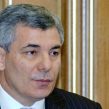
Moscow Is Trying to Use People’s Diplomacy Without Giving Any Power to the People
Publication: Eurasia Daily Monitor Volume: 8 Issue: 106
By:

On May 31, police in Kabardino-Balkaria reported that they prevented an attempt to assassinate the president of the republic, Arsen Kanokov. According to a police source, two roadside bombs, the biggest of them containing five kilograms of TNT, were placed at the entrance to the city of Tyrnyauz on May 26. Kanokov had been expected to visit this Balkar-populated area in the mountains of the republic that day, but the visit was subsequently cancelled (www.kavkaz-uzel.ru, May 31).
News of a planned attack on the Kabardino-Balkarian leader only came five days after the roadside bombs were defused. It is unclear why the police did not disclose this information earlier. Whether there was really an attempt to assassinate the Kabardino-Balkarian leader or the police simply wanted to show off their diligence, the news betrays the republic’s persistent instability and nervousness. On May 30, a policeman was killed in the town of Baksan, one of the most volatile places in Kabardino-Balkaria (www.rian.ru, May 30). On June 1, two suspected militants were killed while driving in a car near the republic’s capital, Nalchik (Interfax, June 1). On May 29, a suspected militant was killed in Nalchik as he allegedly tried to throw a grenade at the police (www.kavkaz-uzel.ru, May 29). On May 31, the police defused an explosive device containing 0.8 kilograms of TNT that had been planted at the police station in Tyrnyauz.
On April 29, the leadership of the Kabardino-Balkarian insurgency was wiped out in a single operation by the Russian security services. The most notorious leaders of the rebels –Asker Jappuev, Kazbek Tashuev and Ratmir Shameyev– and several others were killed in the neighboring Stavropol region near its administrative border with Kabardino-Balkaria. Jappuev, the formal head of the militants, was accused of murdering tourists visiting the republic from Moscow in February 2011 (www.rian.ru, April 29). Following the killing of the tourists, Moscow introduced a counterterrorist operation regime in most parts of Kabardino-Balkaria and banned tourists from coming to the area. Yet, despite the evident successes in destroying the leadership of Kabardino-Balkaria, the counterterrorism regime remains in place to date, and tourist companies are not allowed to operate there.
On May 30, a Russian Public Chamber delegation led by a journalist and political commentator from Moscow, Maxim Shevchenko, met with locals and government officials in the mountainous and predominantly Balkar-populated Elbrus district of Kabardino-Balkaria. People told the delegation that the ban on tourism was taking a heavy toll on the local population, increasing unemployment and crime rates. “People have nothing to eat, so cases of cattle stealing have increased,” said one of the participants in the meeting –the director of a resort sanatorium. Some people went so far as to suggest that introducing the counterterrorism operation regime was unnecessary and done just to divert funds from Kabardino-Balkaria to the nearby Sochi region, which is being prepared for the 2014 Winter Olympic Games. Several people complained about the abduction and subsequent disappearance of their sons, presumably at the hands of the security services. The delegation’s objective, according to Shevchenko, was to foster dialogue between the authorities in Moscow and the people of the North Caucasus. Shevchenko promised to deliver people’s grievances to the right address in Moscow (www.kavkaz-uzel.ru, May 30).
These kinds of events put on display the rigidity and ineffectiveness of the so-called power vertical in Russia, created by Putin according to Soviet and Tsarist traditions, and awkwardly attempts to overcome its shortcomings through dispatching special missions.
At a meeting with residents of the ethnic Russian and Cossack populated Maisky and Prokhladny districts of Kabardino-Balkaria, the local Russians complained about outflow of ethnic Russians, especially the youth, from the republic. The Russian activists blamed the population drain on insecurity and the meager economic opportunities in Kabardino-Balkaria. It is interesting to note that when the Balkars complained to the Moscow Public Chamber delegation about the same phenomenon of outward migration, the delegates reassured them that people resettled and relocated in all countries and that it was normal (www.kavkaz-uzel.ru, June 1). For the Russians and the Cossacks, however, no such reassurances were given. This detail is indicative of Moscow’s attempts to promote the outflow of indigenous people from the North Caucasus and ensure that the ethnic Russian population stays there. While there has been a significant outflow of indigenous people from the North Caucasus to other Russian regions, there are no indications that Russians have been flowing into the republic.
Meanwhile, Kommersant reported that police in Moscow concluded an investigation of a crime that may have a serious impact on public perceptions and the situation in Kabardino-Balkaria. The killing of a Moscow-based soccer fan by a group of North Caucasian youths in December 2010 caused uproar in Russian society and massive riots on Moscow’s Manezh square. The two groups of youth, Muscovites and North Caucasians, were involved in a fist fight when Aslan Cherkesov of Kabardino-Balkaria reverted to using his traumatic gun and killed Yegor Sviridov. Ethnic Russians and Caucasians often clash in Russian cities due to the growing xenophobia in the country, poor policing and corruption. According to Kommersant, investigators concluded that the group of young Russians had not provoked the fight and could not sustain it because its members were very drunk. The investigators said the group of Caucasian youth should bear all the blame for the incident and the killing. Officials said the clash was caused by “cultural differences in behavior” (Kommersant, May 30).
The authorities in Moscow are between a rock and a hard place: on the one hand, they cannot ignore the Russian uprising on Manezh square, but, on the other hand, harsh sentences for the youths from Kabardino-Balkaria and Dagestan will not go down well in their respective republics. The court system is so distrusted in Russia that one of the conflicting sides or both will deem practically any sentence unjust.




